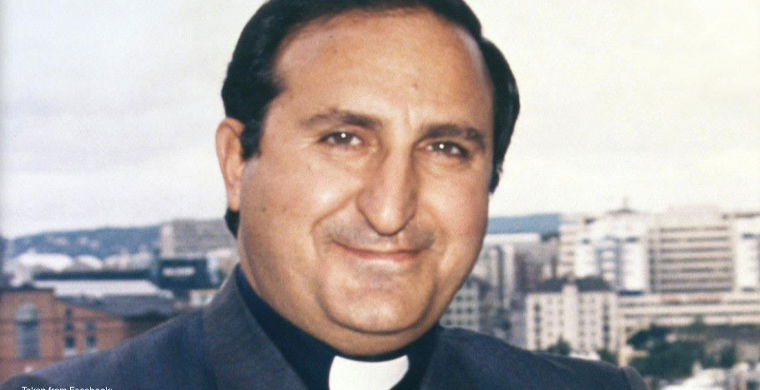Heroes of the Faith: Haik Hovsepian
There are an estimated one million Iranian believers today
By J. John
November 27, 2021
One of the most remarkable stories in modern Christianity is the explosive growth of the Iranian church. At the end of the 1970s there were a few hundred Christians in Iran; it is now estimated that there are as many as a million. It's a worldwide pattern too; Britain alone now has several thousand Iranian believers. I believe it's a work of God, but it has also involved many courageous individuals who have paid the price for their witness. One of the many I could name is Haik Hovsepian.
Some background is probably essential. Iran, or Persia as it is sometimes called, has a long history and as a regional superpower appears in such biblical books as Daniel and Esther. Although Iran fell under Shiite Muslim control from the seventh century ad, Christianity persisted in the minority Armenian community. After the Islamic Revolution of 1979 it was widely expected that the few fellowships of converts from Islam would soon be extinguished. Yet against opposition, the Iranian church began to quietly grow.
A key individual in these remarkable events was Haik Hovsepian. Haik was born in 1945 into a family of Armenian Christians. He trusted in Christ in his youth and joined the Pentecostal Assemblies of God where his gifts for leadership were recognised. Because Armenians have so often been persecuted in the Middle East, it is perhaps understandable that there was a long-standing reluctance to seek trouble by evangelising Muslims. Haik, however, became burdened to reach out to those outside the Christian community, eventually moving to a region that was almost entirely Muslim. He won friends -- and ultimately converts -- through his powerful evangelism and through his evident love for those who had been long seen as enemies. Something of Haik's dynamism, warmth and spiritual power can be seen in a compelling film about him called A Cry From Iran.
Haik married in 1966, and he and his wife Takoosh had four children. His church work grew rapidly so that by the end of the seventies he had founded numerous house churches. Within his denomination he was known as 'Bishop Hovsepian' but remained 'Brother Haik' to most people. Not simply an evangelist but also a powerful apologist and gifted musician, Haik became increasingly recognised as a national leader and was eventually appointed head of the Iranian Assemblies of God.
In the immediate aftermath of the Islamic Revolution in 1979 the evangelical churches were largely spared. Soon, however, the persecution of Christians occurred, focusing first on converts within the Anglican church. Yet the growth of the church proved unstoppable. Although there were human factors such as a growing disillusionment with economic failure and the harshness of the fundamentalist government, it's obvious that God's Spirit was moving powerfully within Iran.
By the late 1980s the authorities were becoming alarmed by the growth of the house churches, but struggled with how to deal with these diffuse and informal fellowships. Eventually they tried legal pressure, imposing rules on churches that were specifically intended to prohibit evangelism, including a ban on any Muslims or Muslim converts entering churches. Haik, now the president of the United Protestant churches of Iran, boldly refused to comply with the law, declaring that he would 'keep his church open to all'. Indeed he went further, protesting to the government that they were breaking their own law on religious tolerance, and appealing to international organisations for support.
A specific case brought matters to a head. One of Haik's close friends was Mehdi Dibaj, who had paid the price for leaving Islam by being imprisoned and tortured for over nine years. In 1993 he was sentenced to death and Haik mounted a global campaign to have him spared. Haik got hold of Dibaj's appeal to the judges and circulated it. An astonishingly powerful document -- often compared to one of the New Testament letters -- it soon spread worldwide. If you haven't read it please do here. https://banneroftruth.org/us/resources/articles/2015/testimony-defence-mehdi-dibaj/
A leading British journalist, Bernard Levin, was so impressed by it that he had it printed in its entirety in The Times; probably the longest statement of Christian belief ever published in that paper! A few days later, the Iranian government released Dibaj.
There was, however, a price to pay. Three days later, Haik Hovsepian disappeared in Tehran, and when his body was eventually found it had multiple stab wounds. The inevitable conclusion was that he had proved to be too powerful an opponent for the state to let him live. Within six months Mehdi Dibaj, too, had met a violent death and soon seven church leaders were also dead.
Haik left a powerful legacy. Most of his family and many of those he led to faith are now leading the church in the Iranian communities across the world. The most prominent of Haik's many strengths was his courage and that is seen in different ways.
First, he stepped out of his own culture. The safe option for Haik was to stay within his own Armenian community. But he was led to go outside it to preach Christ to a culture that was seen as hostile.
Second, he challenged the state. Knowing what was likely to happen, Haik battled against his government over Mehdi Dibaj. The battle cost him his life, but it resulted in a powerful declaration of the gospel to millions.
Finally, he stood up for other believers. Haik took a stand not for himself but for his friends. Jesus said, 'Greater love has no one than this: to lay down one's life for one's friends.' To do that needs not just love but also courage.
Haik Hovsepian has been a hero and example to many Iranians. It's worth considering that as the Western world becomes increasingly hostile to Christianity that he may become a model for us too.
J.John
Reverend Canon
www.canonjjohn.com














